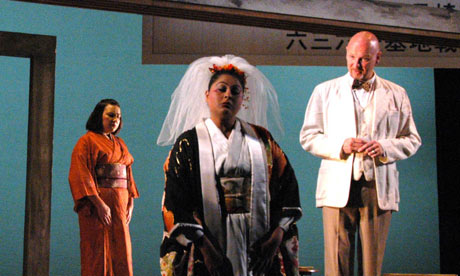
Hiroshima may be synonymous with nuclear devastation but, in 1945, America also bombed Nagasaki, where Puccini's Madame Butterfly is set at the turn of the 20th century. In his new production for the ever-adventurous Mid-Wales Opera, Australian director Stephen Barlow updates the action to the period just after the second world war, with Pinkerton and Butterfly's home sited right under a sign for an American airbase.
Barlow's intention is to play down the traditional Japonisme and play up the psychology of the relationships. Yet while the idea that Cio-Cio San and her family are survivors of the radiation may heighten the implicit cultural incongruities of her marriage contract with Pinkerton, it makes it even harder to reconcile her manic espousal of all things American. It is thanks to artistic director and conductor Nicholas Cleobury driving the score forward with a real feel for its detail that Puccini's characterisations begin to shine through.
In the title role, Meeta Raval's lyric soprano is confident and secure; she makes the transition from mid-teens bride to defiantly proud mother without forcing the tone. Yannis Thavoris's design for the sliding-walled house, clad in patterns of origami paper, could not be simpler; the initial contrast of Cio-Cio San's western veil with her wedding kimono resonates further when the mosquito-netted marriage-bed spells out the butterfly's total entrapment. Her seppuku suicide in the shower cubicle is a gruesome nod to Hitchcock.
Sean Ruane's Pinkerton shows some heart as well as gutsy singing, and Amy J Payne's Suzuki has a maternal solicitude for her mistress. Wyn Pencarreg's portrayal of Sharpless is immensely sympathetic, the American consul compassionate yet helpless in the face of Butterfly's blind obsession. The child of her union with Pinkerton is never seen, which is probably just as well – it's tearful enough without him.

